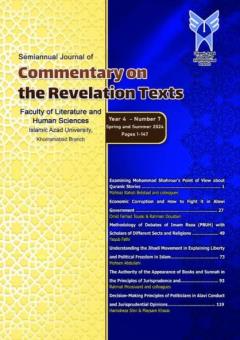Understanding the Jihadi Movement in Explaining Liberty and Political Freedom in Islam, Based on the Alawite Tradition
Subject Areas : Thematic interpretation of Nahj al-Balagha
1 - Associate Professor of Political Science Department, Lorestan University, Khorramabad, Iran
Keywords: Liberty, Political Freedom, Explanation, Jihad, Qur'an, Nahj Al-Balagha, AlawiteTradition,
Abstract :
The concept of freedom and its types from the point of view of different schools and religions have diverse and numerous interpretations. Some people, theories and schools believe that in Islam, liberty and political freedom are far from the ideal standards in the current era. The Qur'an and the Sunnah are two reliable sources that, along with scientific arguments and individual and collective reason, are the clear sources of the Jihadi movement. On this basis, the Alevi way of life and the thoughts of Imam Ali (A.S.) are in a very important position for understanding and applying the concept of freedom. and the centrality of Alavi way of life is enlightening in explaining the fundamental concepts and values of freedom. In this article, we tried to investigate the Jihadi movement in explaining the concept of liberty and political freedom in Islam, focusing on the Alawi way of life and the valuable topics of Nahj al-Balagheh, which are taken from the verses of the Qur'an and the way of life of the Prophet (PBUH). It seems that sufficient theoretical and practical attention to the life of that honorable Imam (A.S.), in an effective and comprehensive manner and in the form of a jihadi movement, can lead to the explanation and implementation of the concept of liberty and political freedom.
الف- منابع فارسی و عربی
قرآن کریم (1397)؛ ترجمه حسین انصاریان، مشهد: به نشر (آستان قدس رضوی).
نهجالبلاغه (1378)؛ ترجمه جعفر شهیدی، تهران: انتشارات علمی و فرهنگی.
نهجالبلاغه (1379)؛ ترجمه محمد دشتی، قم: انتشارات سید جمالالدین اسدآبادی.
بحرانى، میثم بن علی (1366)؛ اختیار مصباحالسالکین، تحقیقِ محمدهادى امینى، چاپ اول، مشهد: بنیاد پژوهشهای اسلامى آستان قدس رضوى.
آل غفور، سید جلال (1389)؛ مولفه های توسعه سیاسی در نهج البلاغه، فرهنگ پژوهش، شماره ۶، 7-30.
خامنهای، سید علی (1401- 1388)؛ پایگاه اطلاعرسانی رهبر معظم انقلاب اسلامی، نسخه فارسی، لینک ثابت دسترسی= https://farsi.khamenei.ir/
دهخدا، علیاکبر (1377)؛ لغتنامه، تهران: مؤسسه چاپ و انتشارات دانشگاه تهران.
دلشاد تهرانی، مصطفی (1395)؛ تراز حیات: ساختارشناسی عدالت در نهجالبلاغه، تهران: انتشارات دریا.
عباسی، فرهاد (1391)؛ تعریف حدود و انواع آزادی در حکومت دینی از دیدگاه نهجالبلاغه، فصلنامه مطالعات حقوق بشر اسلامی، شماره 2، 99-120.
قدردان قراملکی، محمدحسن (1399)؛ آزادی در فقه و حدود آن، قم: بوستان کتاب.
محمدی ریشهری، محمد (1390)؛ سیاستنامه امام علی علیهالسلام، ترجمه مهدی مهریزی، قم: موسسه فرهنگی دارالحدیث.
مطهری، مرتضی (1381)؛ مجموعه آثار، ج 16، قم: صدرا.
مطهری، مرتضی (1393)؛ انسان کامل، قم: صدرا.
منتظر قائم، مهدی (1376)؛ آزادی سیاسی، فصلنامه حکومت اسلامی، سال 8، شماره 3، 100-128.
میراحمدی، منصور (1381)؛ آزادی در فلسفه سیاسی اسلام، چاپ اول، قم: بوستان کتاب.
ناظمی اردکانی، محمد (1387)؛ حکمرانی خوب با رویکرد اسلامی، علوم انسانی، سال 17، شماره76، 107-128.
ب- منابع لاتین
Arendt, H. (1998). The Human Condition. Chicago: University of Chicago Press.
Aristotle. (1998). Politics (C. D. C. Reeve, Trans.). Indianapolis: Hackett Publishing.
Locke, J. (1988). Two Treatises of Government. Cambridge: Cambridge University Press.
Mill, J. S. (2006). On Liberty. London: Penguin Classics.
Plato. (2003). The Republic (D. Lee, Trans.). London: Penguin Books.
Rousseau, J. J. (2002). The Social Contract (M. Cranston, Trans.). London: Penguin Classics.

